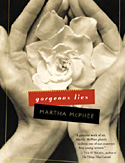Reading Room
Bulletins from the Homefront

The American family: We used to know what it was—or we thought we knew. But as the decades passed, and Ozzie Nelson transmogrified into Ozzy Osbourne, our ideas about family began to change. This month, two unusually strong novels and a masterful story collection explore the wild frontier of domestic life.
In Martha McPhee's Gorgeous Lies (Harcourt), Anton Furey (of McPhee's acclaimed first novel, Bright Angel Time) is the dying patriarch of a household that includes his own five children by his first wife, his second wife's three children, and the daughter they have together. Now adults, the Furey-Cooper progeny adore the charismatic Anton, who has molded them into his idea of the perfect American family: intellectually adventurous, spiritually enlightened, emotionally secure. As his stepdaughter says, "It's what most everybody wants, of course—that safe place of family, the bosom of my family, our tiny countries, magnificent empires that exist by a string." But as Anton sickens, that string begins to fray. Loyalties weaken; hidden rivalries come to the surface. For his survivors, Anton's dying is like an earthquake: a rumble as the ground gives way beneath them, then the guilty aftershocks of hope.
Middlesex (Farrar, Straus & Giroux), by Jeffrey Eugenides (The Virgin Suicides), is a multigenerational saga of Homeric proportions, narrated with heroic wit by a 41-year-old hermaphrodite named Cal. "I was born twice," he tells us, first as a baby girl (her name was Calliope) and later as a teenage boy. Cal's genetic fate was sealed when a lovesick brother and sister—his paternal grandparents—fled their battle-ravaged homeland in Asia Minor in the early 1920s, arriving in Detroit as husband and wife. "Sing now, O Muse, of the recessive mutation on my fifth chromosome!" writes Cal with epic tongue in cheek, as he spins his fabulous tale of sexual misadventure and gender-bending love.
Nobody probes the soft, dark underbelly of family life more expertly than A.M. Homes. Her new collection of stories, Things You Should Know (HarperCollins), is her first in a dozen years (the movie version of The Safety of Objects will be out in 2003). Homes's characters are desperate for human connection, which they fear and violently reject. A husband wants to leave his wife but feels addicted to her, even as she recoils from him. "It is about wanting and need...needing to get what you never got, wanting it still, wanting it all the more," Homes writes in "Remedy," the story of a stressed executive who calls her aged parents only to find a stranger inexplicably replacing her in their lives. "It is about holding back, withholding. It is about being stuck. It is about panic. It is about realizing you are in over your head, something's got to give." These are stories to make you shudder lightly, and reach for a hand in the dark.
In Martha McPhee's Gorgeous Lies (Harcourt), Anton Furey (of McPhee's acclaimed first novel, Bright Angel Time) is the dying patriarch of a household that includes his own five children by his first wife, his second wife's three children, and the daughter they have together. Now adults, the Furey-Cooper progeny adore the charismatic Anton, who has molded them into his idea of the perfect American family: intellectually adventurous, spiritually enlightened, emotionally secure. As his stepdaughter says, "It's what most everybody wants, of course—that safe place of family, the bosom of my family, our tiny countries, magnificent empires that exist by a string." But as Anton sickens, that string begins to fray. Loyalties weaken; hidden rivalries come to the surface. For his survivors, Anton's dying is like an earthquake: a rumble as the ground gives way beneath them, then the guilty aftershocks of hope.
Middlesex (Farrar, Straus & Giroux), by Jeffrey Eugenides (The Virgin Suicides), is a multigenerational saga of Homeric proportions, narrated with heroic wit by a 41-year-old hermaphrodite named Cal. "I was born twice," he tells us, first as a baby girl (her name was Calliope) and later as a teenage boy. Cal's genetic fate was sealed when a lovesick brother and sister—his paternal grandparents—fled their battle-ravaged homeland in Asia Minor in the early 1920s, arriving in Detroit as husband and wife. "Sing now, O Muse, of the recessive mutation on my fifth chromosome!" writes Cal with epic tongue in cheek, as he spins his fabulous tale of sexual misadventure and gender-bending love.
Nobody probes the soft, dark underbelly of family life more expertly than A.M. Homes. Her new collection of stories, Things You Should Know (HarperCollins), is her first in a dozen years (the movie version of The Safety of Objects will be out in 2003). Homes's characters are desperate for human connection, which they fear and violently reject. A husband wants to leave his wife but feels addicted to her, even as she recoils from him. "It is about wanting and need...needing to get what you never got, wanting it still, wanting it all the more," Homes writes in "Remedy," the story of a stressed executive who calls her aged parents only to find a stranger inexplicably replacing her in their lives. "It is about holding back, withholding. It is about being stuck. It is about panic. It is about realizing you are in over your head, something's got to give." These are stories to make you shudder lightly, and reach for a hand in the dark.



